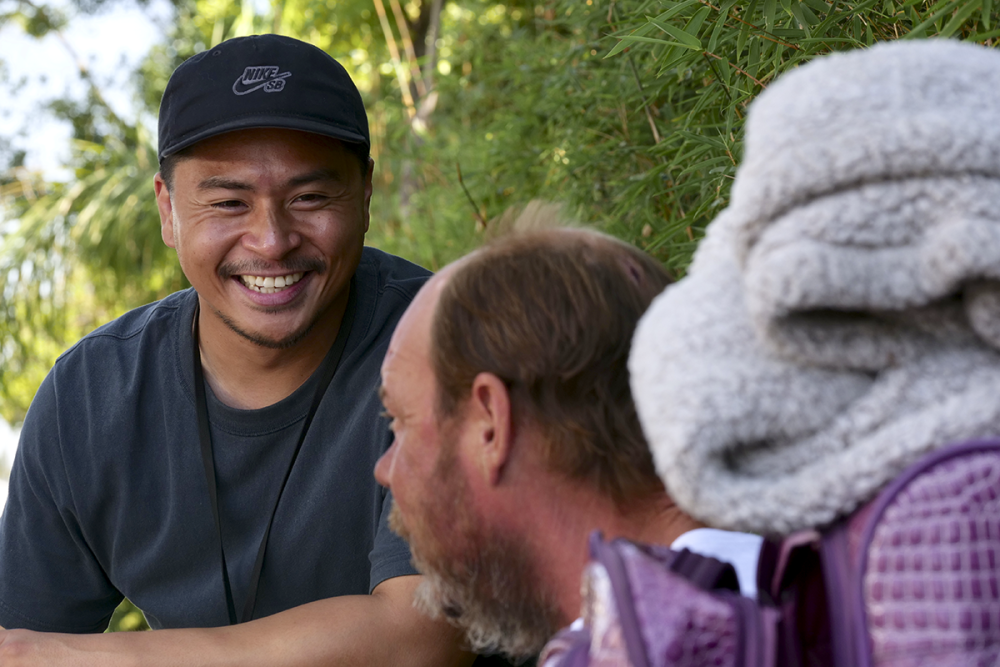The City is Joining a Legal Case on Homeless Encampments. Here’s Why.
September 21, 2023

One of the major challenges the City of San Diego faces in its continued efforts to address homelessness stems from various legal settlements and court rulings that limit what the City can do.
Through a legal settlement reached in 2007, for example, the City cannot enforce on illegal lodging violations between 9 p.m. and 5:30 a.m.
The settlement was modified in 2010 to allow enforcement in the Downtown area between those hours if the San Diego Police Department responds to a complaint and is able to offer an available bed within the Downtown area, then the person refuses to accept the bed.
A 2011 settlement guides how the City can do clean-ups when property of a person experiencing homelessness is involved. This resulted in the City creating its storage program, where people experiencing homelessness can store personal belongings. In addition, the settlement agreement included guidelines for giving advance notice to people experiencing homelessness for encampment abatements.
A 2019 settlement resulted in the San Diego Police Department’s adoption of progressive enforcement for when people experiencing homelessness are encroaching on public property with personal belongings. Under the progressive enforcement model, officers offer shelter at every interaction before taking any enforcement action.
On top of these settlements, the City must comply with applicable federal, state, and local law in addressing homelessness. For example, in 2018, in Martin v. Boise, the United States Court of Appeals for the Ninth Circuit ruled that governments cannot criminalize indigent, homeless people for sleeping outdoors on public property if there is no option of sleeping in a shelter.
Over the years, cases like these have resulted in a complicated web of restrictions that have made it difficult for cities to respond to our constituents’ requests to address homeless encampments that are causing health and safety concerns.
Soon, the United States Supreme Court may consider another legal challenge to a municipality working to address homelessness. The City of Grants Pass, Ore., is asking to be allowed to regulate where people can camp in public spaces.
Grants Pass is appealing to the U.S. Supreme Court to help untie the hands of cities that are attempting to respond to the proliferation of encampments in our communities.
Because cities must be allowed to address the significant public health and safety dangers posed by the unsafe and unsanitary conditions found in homeless encampments, the City of San Diego will file an amicus brief in support of the appeal. The City has an obligation to all residents, not just those living in tents on our sidewalks.
The City of San Diego has dramatically expanded shelter and services and passed reforms to make it easier to build affordable housing. We are getting people connected with shelter and services and on the path to permanent housing.
But alongside this work, we must be allowed to enforce our laws and keep our sidewalks and parks clean, safe and accessible to everyone.
Filter by Category
Airports (1)
Arts and Culture (9)
Business (20)
City Planning (1)
Environment (46)
Human Interest (7)
Library (14)
Parks and Recreation (21)
Personnel (11)
Public Safety (20)
Public Works (58)
Streets (1)
Technology (4)
Transportation (1)
Airports (1)
Arts and Culture (9)
Business (20)
City Planning (1)
Environment (46)
Human Interest (7)
Library (14)
Parks and Recreation (21)
Personnel (11)
Public Safety (20)
Public Works (58)
Streets (1)
Technology (4)
Transportation (1)
